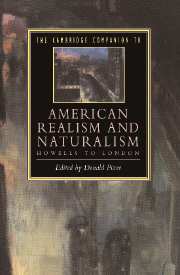Book contents
- Frontmatter
- Introduction
- PART ONE HISTORICAL CONTEXTS
- PART TWO CONTEMPORARY CRITICAL ISSUES
- PART THREE CASE STUDIES
- 5 The Portrait of a Lady and The Rise of Silas Lapham
- 6 The Realism of Adventures of Huckleberry Finn
- 7 The Red Badge of Courage and McTeague
- 8 What More Can Carrie Want? Naturalistic Ways of Consuming Women
- 9 The Awakening and The House of Mirth
- 10 The Call of the Wild and The Jungle
- 11 Troubled Black Humanity in The Souls of Black Folk
- Further Reading Index
- Index
5 - The Portrait of a Lady and The Rise of Silas Lapham
from PART THREE - CASE STUDIES
Published online by Cambridge University Press: 28 May 2006
- Frontmatter
- Introduction
- PART ONE HISTORICAL CONTEXTS
- PART TWO CONTEMPORARY CRITICAL ISSUES
- PART THREE CASE STUDIES
- 5 The Portrait of a Lady and The Rise of Silas Lapham
- 6 The Realism of Adventures of Huckleberry Finn
- 7 The Red Badge of Courage and McTeague
- 8 What More Can Carrie Want? Naturalistic Ways of Consuming Women
- 9 The Awakening and The House of Mirth
- 10 The Call of the Wild and The Jungle
- 11 Troubled Black Humanity in The Souls of Black Folk
- Further Reading Index
- Index
Summary
The company they kept, very often, was each other. Henry James and William Dean Howells first met in 1866, at Cambridge, Massachusetts. Howells was the newly hired assistant editor of the Atlantic Monthly, the organ of New England's literary dominance. James was a promising young writer, six years Howells's junior, whose stories had begun to appear in the magazine, thanks in large part to the advocacy of the assistant editor. From 1866 until James departed for Europe in 1869, the two men were nearly inseparable companions. In a public letter on the occasion of Howells's seventy-fifth birthday, James paid tribute to the “frankness and sweetness” of Howells's hospitality and the inspiration of his sympathy during their Cambridge years. “You showed me the way and opened me the door,” he recalled; “you wrote to me, and confessed yourself struck with me - I have never forgotten the beautiful thrill of that.” As Howells remembered, in an essay left unfinished at his death in 1920, “We seem to have been presently always together, and always talking of methods of fiction, whether we walked the streets by day or night, or we sat together reading our stuff to each other.”
- Type
- Chapter
- Information
- The Cambridge Companion to American Realism and NaturalismFrom Howells to London, pp. 117 - 137Publisher: Cambridge University PressPrint publication year: 1995
- 2
- Cited by

